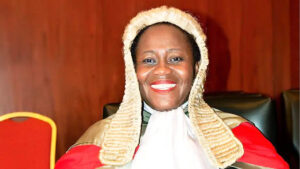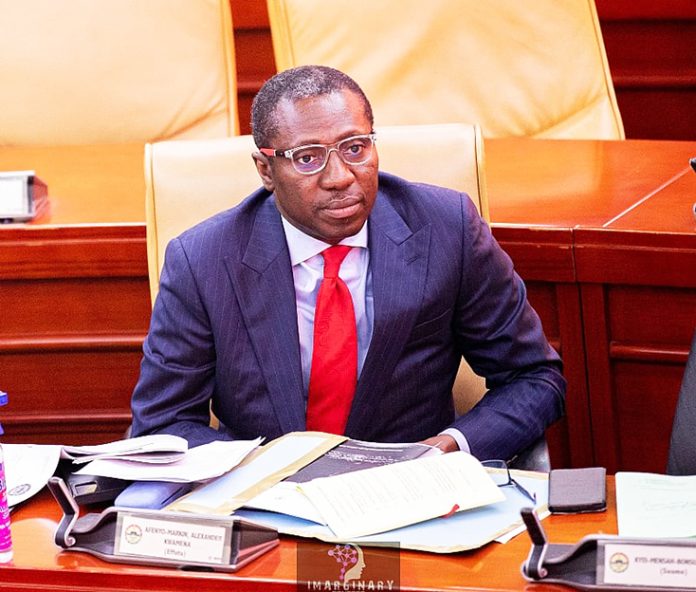The Majority Leader of the Parliament of Ghana, Alexander Afenyo-Markin, has defended the Chief Justice’s proposal to expand the Supreme Court from 15 to 20 judges, noting that the move was apt and timely to improve justice delivery.
The opposition National Democratic Congress (NDC) had on Thursday, July 4, 2024 called on President Akufo-Addo not to consider the nomination of five new judges to the Supreme Court, after it became public that the Chief Justice Gertrude Torkornoo had recommended to the President to do so, based on an analysis of the workload situation confronting the country’s apex court.
At a press conference addressed by the party’s General Secretary, Fifi Fiavi Kwetey, the NDC noted that there were enough judges on the bench at “this particular point in time” to deal with judicial issues.

“With elections on the horizon, it is fair that any such appointment with far-reaching implications on this constitutional democracy should be left for the next President of Ghana. The President must be reminded that such lopsided appointments, particularly to the judiciary, is a big factor in the widely held perception of a politically biased and hostile judiciary in the administration of justice at the apex court, especially, in matters involving the NDC”, the NDC General Secretary noted.
He also told the President to stop the appointments of the new judges to help de-escalate the perception of judicial bias.
However, the Majority Leader, Alexander Afenyo-Markin dismissed the claim advanced by the NDC in a counter press conference held on Monday, July 8, 2024.
Addressing the Parliamentary Press Corps, the Majority Leader argued that the Supreme Court was not bound by the election timetable to increase its judges.
“An institution like the Supreme Court, with its mandate to deliver justice, is not bound by the election timetable of the country. The impression critics are trying to create is that all the Supreme Court does is determine political cases.
“But I can tell you on good authority that political cases at the Supreme Court may not even be up to 2% of the cases they deal with. Several cases go there, so the narrow path taken by critics to create the impression that the timing was wrong is neither here nor there,” he stated.
Afenyo-Markin also dispelled claims that the Chief Justice lacked the powers to increase the number of Supreme Court judges. According to him, the Chief Justice has inherent powers under Article 125(4) of the Constitution to make such recommendations, as the head of the Judiciary responsible for its administration and supervision.
“The Chief Justice has initiated a proposal to expand the Supreme Court to 20 judges for efficiency and effectiveness. Some people say the Chief Justice does not have the mandate to do so.
“However, we disagree. Under Article 125(4) of the 1992 Constitution, the Chief Justice has inherent powers to make such proposals as the Chief Executive and Head of the Judiciary,” he noted, quoting the article to support his argument.
“Article 125(4) reads: ‘The Chief Justice shall, subject to this constitution, be head of the Judiciary and shall be responsible for the administration and supervision of the Judiciary.’ The question is: What constitutes administration and supervision? When someone is in charge of managing a body, they can determine how to run it efficiently and make proposals within the context of the law,” he explained.
Afenyo-Markin, also the New Patriotic Party (NPP) Member of Parliament for Effutu, emphasized that the Constitution does not set an upper limit on the number of Supreme Court judges and that the Chief Justice’s proposal was justified given the court’s heavy workload and mandate to deliver justice.
He noted that the Supreme Court handles various cases, including original jurisdiction, appellate jurisdiction, and supervisory jurisdiction, unlike the US Supreme Court, which has a narrower jurisdiction.
The Majority Leader also pointed out that the Ghana Bar Association and other stakeholders support the expansion of the court in principle. He dismissed the claims of judicial bias, stating that President Akufo-Addo would not benefit from “packing the court” and that the proposal by the Chief Justice was aimed at improving justice delivery, not political gain.
Afenyo-Markin concluded that the Chief Justice’s recommendation was legal, constitutional, and necessary to enhance the Supreme Court’s efficiency and effectiveness.
By Stephen Odoi-Larbi









